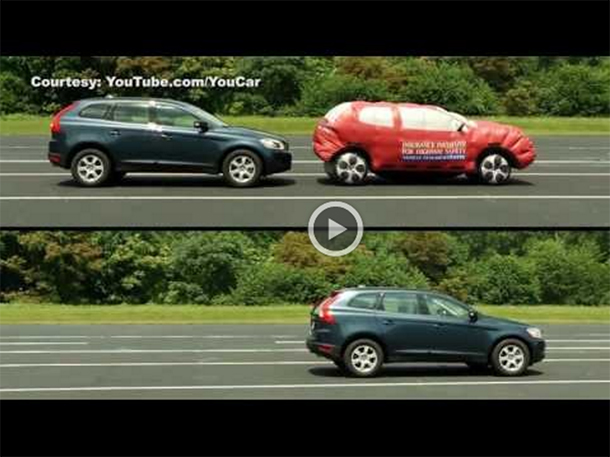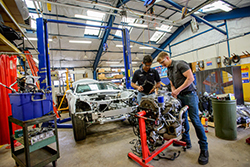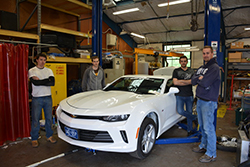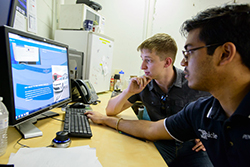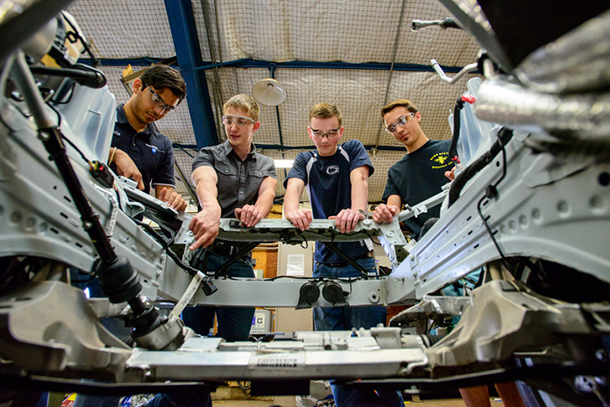
Aerospace engineering senior Davendra Chatterpaul and mechanical engineering seniors Kyle Anschuetz, Connor Disco and Aaron Westbrook, left to right, look into the hollowed engine cavity of a donated 2016 Chevrolet Camaro. The team is converting the Camaro to a hybrid-electric vehicle for the EcoCAR 3 competition.
Penn State Advanced Vehicle Team powers students on the road to success
05/23/2016
By Justin McDaniel
UNIVERSITY PARK, Pa. — Penn State’s Advanced Vehicle Team is much like a car company in miniature. In lieu of sales and profits, however, success is instead measured in trophies, teamwork and the experience won from hours of toil and trial and error.
Over a four-year period, a student-driven team, from majors as diverse as the University itself, will design, build, refine and market a hybrid-electric vehicle that closely mimics the steps an actual automaker would take to bring a new product to market.
The team’s current mission is to take a 2016 Chevrolet Camaro and re-engineer it from a gas-gulping sports car into a fuel-efficient hybrid — without sacrificing a Camaro’s signature performance characteristics. That means the students will be pairing the car’s traditional engine with an electric motor of their own design.
“The crux of this project is not only to have a hybrid-electric vehicle when we are finished, but to give students — to give future industry professionals — the ability to take that path in getting to a hybrid-electric vehicle,” said Davendra Chatterpaul, a senior Penn State aerospace engineering major and the team’s project manager.
The road map for that journey is the EcoCAR 3 competition, a national contest featuring 16 universities from across North America organized by Argonne National Laboratory and sponsored by General Motors Co. and the U.S. Department of Energy.
The contest is in the second year of its four-year cycle, and over the course of the past semester the team took the concepts it designed in year one and implemented them in an actual Camaro, donated by GM to all 16 teams in December. While the competition’s overall winner won’t be determined until 2018, yearly winners are crowned, and the team is currently participating in the year two end-of-year competition, which began May 16 in Yuma, Arizona, and wraps up May 26 in San Diego, California.
“The year-end competition is largely about showing what progress we have made thus far,” said Hugo McMenamin, the team leader and a second-year graduate student in mechanical engineering. “Have we hit the milestones? Have we completed integration? Have we completed design? Have we determined what components we want to use? Are we moving along? It’s really going through the process of making a product and trying to sell that product, which is modeled after General Motors’ own vehicle development process.”
Training tomorrow’s industry professionals
Along the way students gain practical experience in all phases of the project’s evolution, preparing them for future careers in the auto industry.
“Something to keep in mind is this is a very real-world application, so students on our team get to work with the software that industry professionals use across the globe,” said Chatterpaul. “Students also get hands-on experience through our facilities and garage here. We think that it’s great for students to get that knowledge and experience, but we want to make sure they are prepared from the very beginning, starting with the concepts of safety, the concepts of engineering, and then going through the actual implementation of it.”
A key aspect of the team is that it is student-run from top to bottom. Faculty advisers are present to provide guidance, but the students themselves oversee and lead the project.
“Our advisers provide a hands-off approach,” said Chatterpaul. “This means only after we as students have exhausted all of our attempts at solving a problem do the faculty advisers get involved. Only after we have reached the limitations of our knowledge as students do we try to involve the faculty advisers. We are truly a student-run organization here at Penn State. That’s something we are extremely proud of.”
That focus on the student provides opportunities to develop leadership skills that can translate to successful careers in any field. The competition charges the teams with producing multiple deliverables — things like the control algorithm, system modeling and simulation, electrical engineering, mechanical engineering, communications, innovation and more — and a student leader oversees each of these functional areas.
Advanced-level technology
Innovation in particular plays an important role in the EcoCAR 3 competition, driving each of the 16 teams to come up with something that has not been done before, or to take an existing technology and make it better, in an effort to leave a new mark on the industry.
“Every team has its own innovation topic that is used to impact the hybrid-electric vehicle industry in a different way,” Chatterpaul said. “It may be something as simple as the way the car charges, or something like collision avoidance. But every team has the ability to come up with its own way to impact the hybrid-electric vehicle market.”
Last year, for example, the team worked on a technology called model-predictive control, which essentially is a system where the vehicle determines the most fuel-efficient way to get from point A to point B — taking into account the terrain — using both the electric motor and the internal-combustion engine.
This year, the team’s innovation focuses on a technology it calls linear temporal logic, which is a method of trying to plan a path to avoid a collision.
“So you might see BMW, Mercedes-Benz or Lexus commercials where a driver kind of looks down and then looks up and sees a giant truck is stopped right in front of them, and they don’t have time to depress the brake pedal, so the car itself brakes for them and maybe steers out of the way,” said McMenamin.
“With our technology, this path-planning will be less autonomous than that and more suggestive. So, let’s say the car can recognize that four seconds from now, if you don’t depress the brake pedal, you’re going to get in a crash. The car will actually show up on your display, saying, ‘Hey, let’s veer to the right or veer to the left, or maybe apply the brakes’ so you don’t get in a car crash. So we’re able to use linear temporal logic to basically look out at a setting and figure out what the driver needs to do next.”
Non-engineers need apply
While many Advanced Vehicle Team alumni have gone on to careers in the auto industry, countless others have used the experience as a springboard to success in other areas, as car knowledge is a plus but not a prerequisite for a role on the team.
The core of the team’s membership, which stands at nearly 70 students, is comprised of engineering students participating for credit in courses like M E 442W Advanced Vehicle Design I or the first-year engineering seminar, ENGR 097S. However, a corps of volunteers made up of students from across the University is essential to the team’s success.
“We are a very diverse group,” Chatterpaul said. “We have students from the Smeal College of Business, we have College of Engineering students, we have graphic designers, etc. We are not just a team of engineers.”
“We have 10 College of Communications students working on the team as well,” McMenamin added. “A majority of them are juniors in Dr. Lee Ahern and Dr. Denise Bortree’s advertising and public relations classes, and they have been very helpful. We’re trying to get the engineers to work with the communications students, because year four is really all about communications and marketing the vehicle.”
With the contest spanning four years, an interesting dynamic is the team’s ever-changing makeup. As students graduate and leave the University, the team must withstand the pressures of turnover from one year to the next, so new members are warmly welcomed.
Despite that turnover, the competition will go on, and the team will begin preparing for year three soon after returning home from California later this month — hopefully with a new trophy in hand to add to the many others that adorn its workspace. To attain the trophy it ultimately seeks, that of the EcoCAR 3 champion, will take the time and skills of a new crop of team members willing to step in and help the team on the next leg of its journey.
“It’s really never too late to join this team or this competition,” said Chatterpaul. “There’s always room for students to join, to lend a hand, and to learn, be it this year or next. We all benefit from different perspectives.”
The Advanced Vehicle Team meets weekly throughout the academic year. Students interested in joining the team can learn more by visiting www.avt.psu.edu or contacting Chatterpaul at dyc5290@psu.edu or McMenamin at hhm110@psu.edu.


